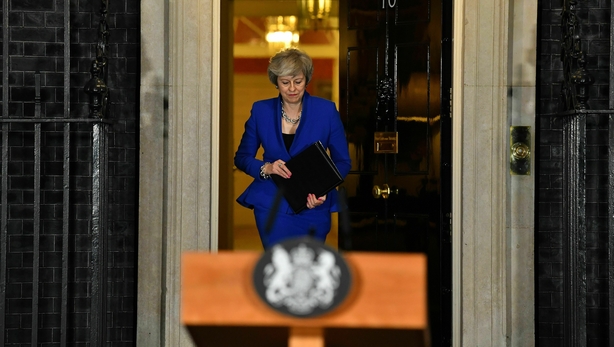The British parliament will debate and vote on Prime Minister Theresa May's Brexit 'Plan B' on 29 January, the leader of the House of Commons Andrea Leadsom has said.
Mrs May's initial Withdrawal Agreement was rejected by a large majority earlier this week.
Mrs Leadsom said the prime minister would put forward a motion and make a statement on her next steps on Monday.
"A full day's debate on the motion will take place on Tuesday 29 January, subject to the agreement of the house," she told parliament.
Her comments come as Mrs May meets MPs and opposition leaders for cross-party talks before she presents an alternative proposal to parliament
However, she is facing a deadlock as her opponents have set out a list of demands for cooperating, including ruling out the possibility that Britain would leave the EU in March without any deal at all.
Labour has accused Mrs May of failing to show "good faith" by insisting that she will not drop her negotiating red lines.
In a speech in Hastings, Labour leader Jeremy Corbyn said: "Last night's offer of talks with party leaders turned out to be simply a stunt, not the serious attempt to engage with the new reality that is needed.
"I say to the Prime Minister again: I am quite happy to talk but the starting point for any talks about Brexit must be that the threat of a disastrous no-deal outcome is ruled out, taken off the table, and we can talk about the future of the plans that we will put forward and the future relationship with Europe."
Mrs May conceded the divorce terms she struck with the EU had been roundly rejected, after MPs delivered the heaviest government defeat in parliament in modern British political history on Tuesday - 432 votes to 202.
"Now MPs have made clear what they don't want, we must all work constructively together to set out what parliament does want," Mrs May said in a televised address to the nation last night, after winning a no-confidence vote triggered by the Labour Party.
She set out a schedule of cross-party talks that began immediately with meetings with the Scottish nationalist, Welsh nationalist and the pro-EU Liberal Democrat leaders.
She also met DUP leader Arlene Foster and her deputy Nigel Dodds, with the DUP’s 10 MPs providing crucial support to Mrs May to allow her to see off the Labour motion by 19 votes.
Useful discussion with the Prime Minister.
— Nigel Dodds (@NigelDoddsDUP) January 16, 2019
Lessons will need to be learned from the vote in Parliament.
The issue of the backstop needs to be dealt and we will continue to work to that end. pic.twitter.com/cbVGNQobta
"We must find solutions that are negotiable and command sufficient support in this House," she had told parliament earlier.
We need your consent to load this rte-player contentWe use rte-player to manage extra content that can set cookies on your device and collect data about your activity. Please review their details and accept them to load the content.Manage Preferences
Mrs May last night said she was "disappointed" by Mr Corbyn's decision and stressed that "our door remains open". Her spokesman said the possibility of a "no deal" was still on the table.
Ian Blackford of the SNP said his party would only participate if she were prepared to consider delaying Brexit, ruling out a "no deal" and the option of holding a second referendum.
Mrs May has flatly rejected a second vote.

The prime minister is working to the tightest-possible deadline as Britain prepares to leave the union that for half a century defined its economic and political relations with the rest of the world.
Her defeat sparked warnings from European leaders that the prospect of "no deal" had increased, with the potential for huge economic disruption on both sides of the Channel.
Mrs May must return to parliament on Monday with a Plan B that she and her team intend to negotiate with various MPs through the weekend.
She stuck to two key principles last night: limiting EU migration and pursuing an independent trade policy.
Both points rule out Labour hopes of membership of an EU customs union or its single market.
Yet she also hinted at the possibility of delaying Brexit.
Mrs May said the EU would allow this "if it was clear that there was a plan that was moving toward an agreed deal".
EU officials have said extending the negotiating period could be possible until the newly elected European Parliament meets in July.
Meanwhile, former British prime minister Tony Blair has said that a delay to Brexit is now inevitable.
Speaking on BBC Radio 4, he said: "That's inevitable, in virtually whatever you do ... If I was the government now, I would already be having discussions with Europe about the terms of an extension."
Extending the #Brexit deadline is "inevitable" says Tony Blair: "If I was the government now, I would already be having discussions with Europe about the terms of an extension" #r4today https://t.co/55w4Ws2GFr pic.twitter.com/lxWzAYZr4x
— BBC Radio 4 Today (@BBCr4today) January 17, 2019
Here, the Minister for Education has said that the Government is taking a "prudent" approach to Brexit and the possibility of a no-deal scenario.
Speaking on RTÉ’s Morning Ireland, Joe McHugh said that there would have to be some sort of border in the event of a no-deal scenario.
However, he said the Government would not accept a physical border on the island of Ireland.
Yesterday, the Taoiseach said that the onus is on Westminster to come up with solutions that they can support and that the EU and Ireland can accept.
Additional reporting AFP

